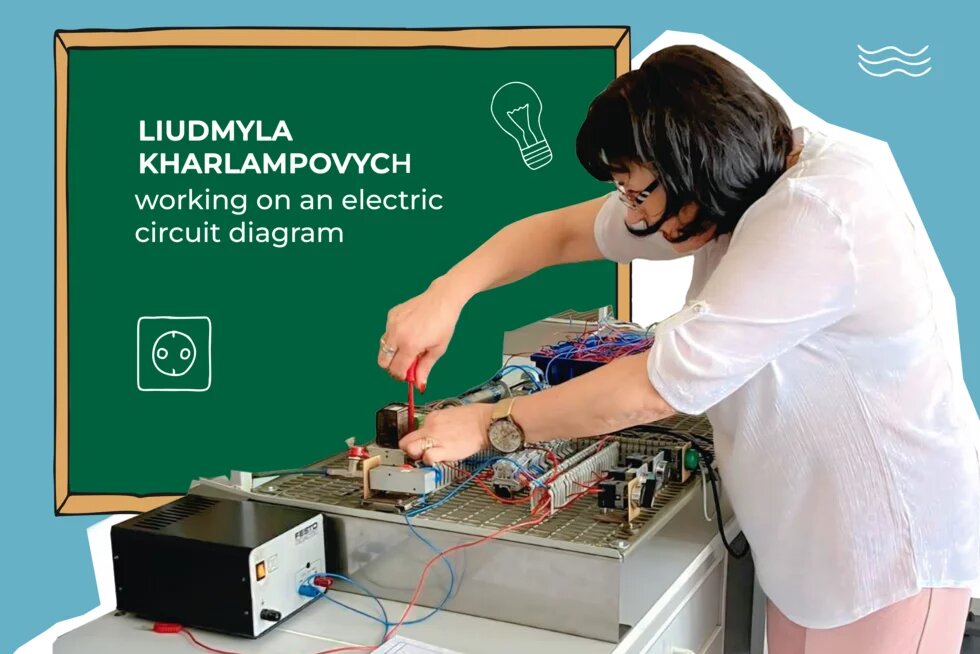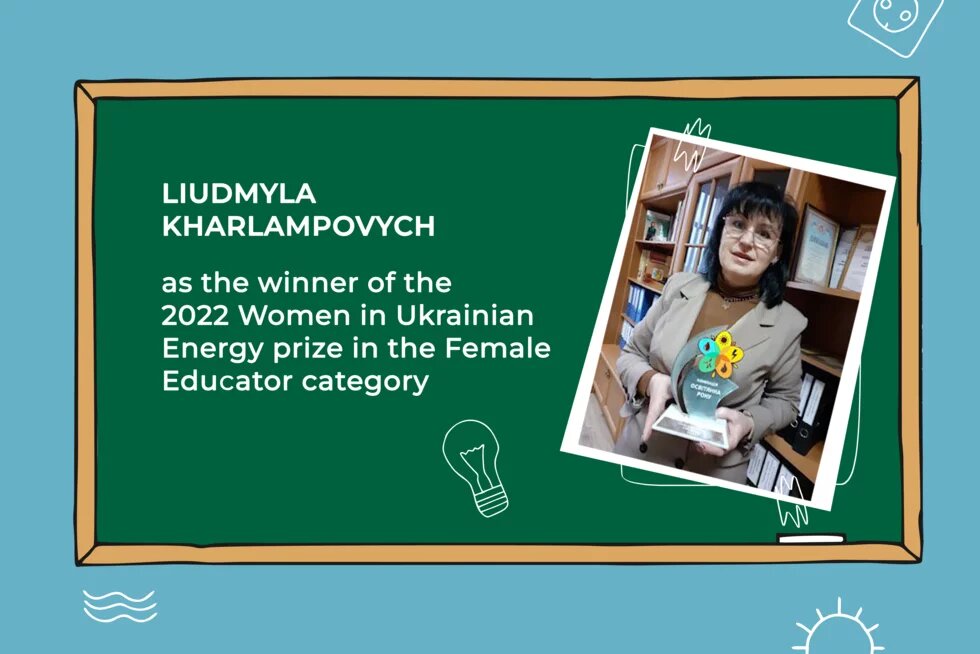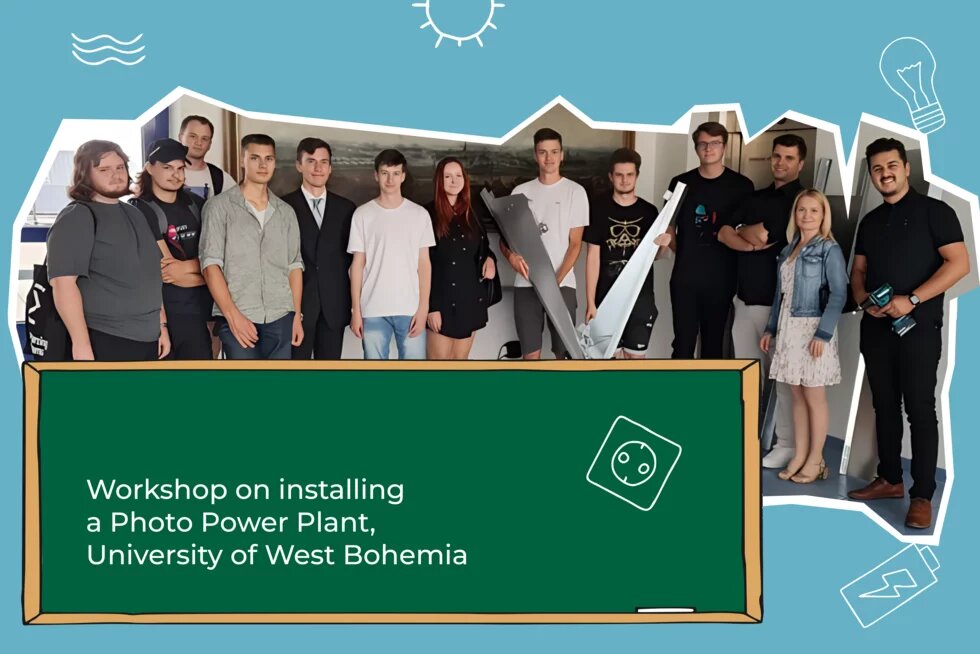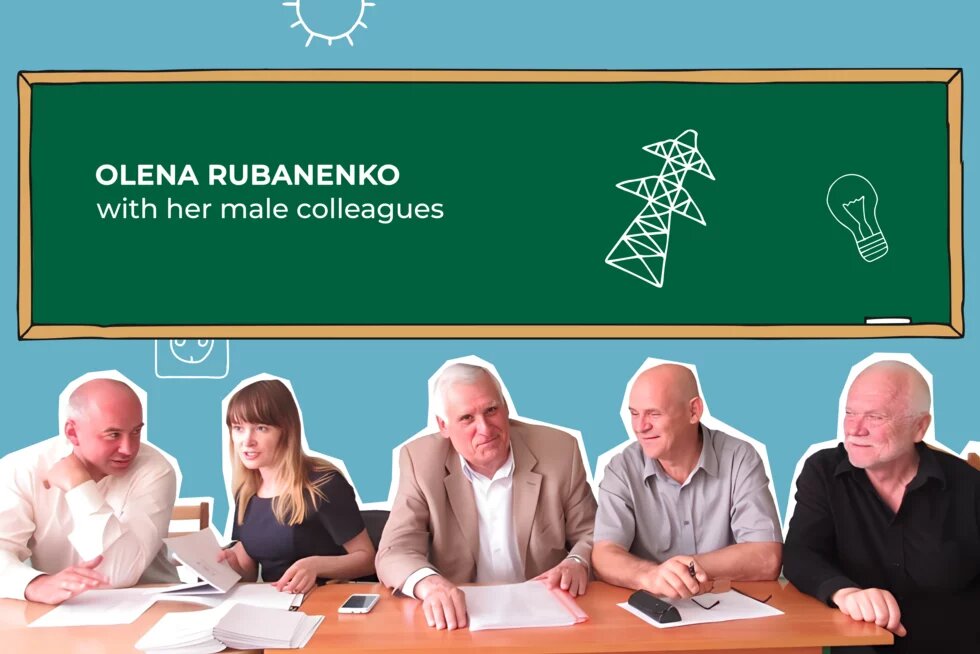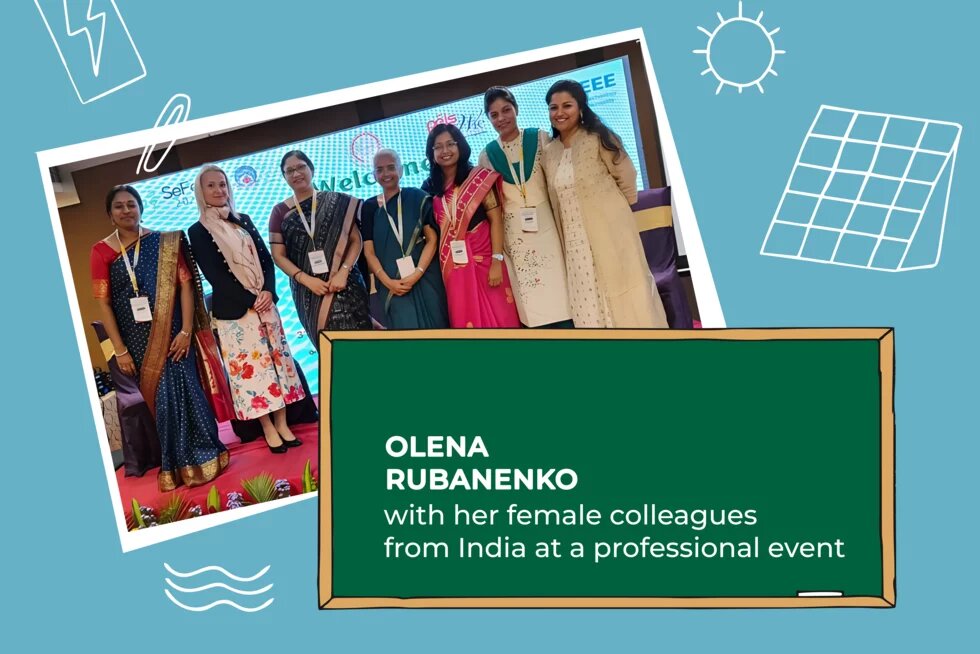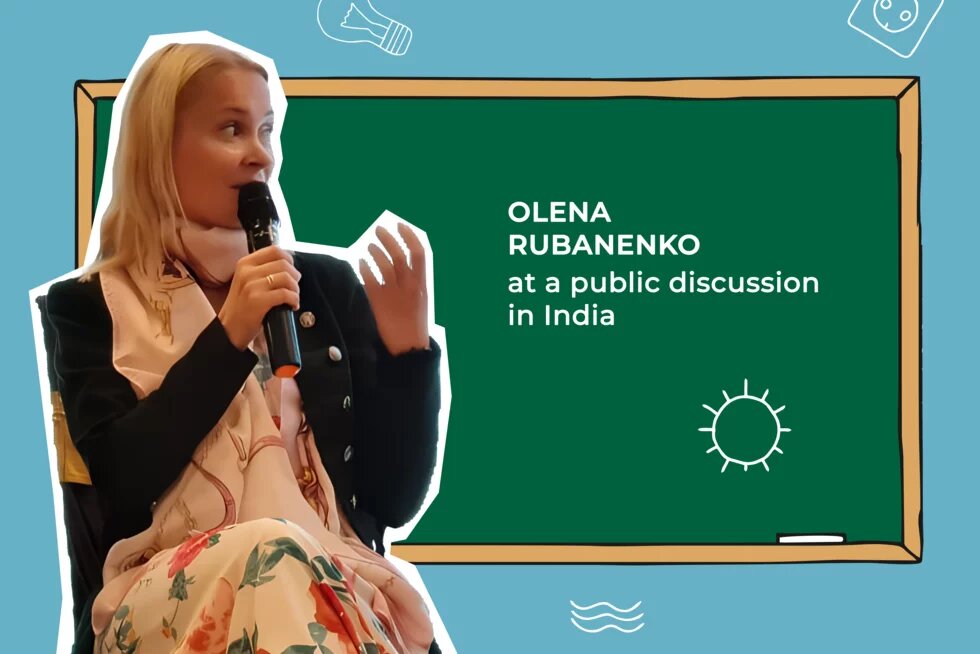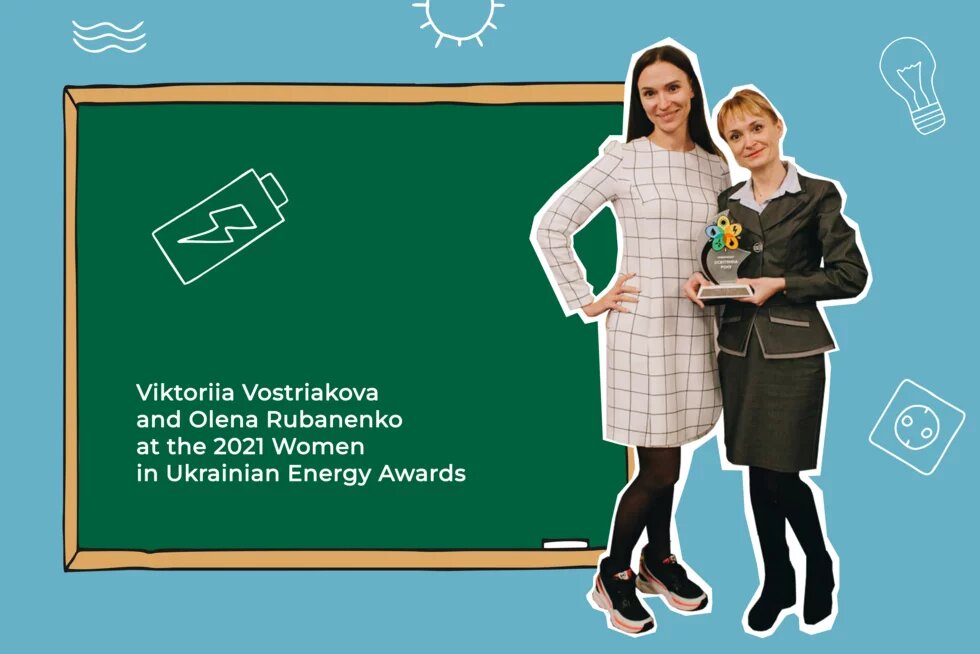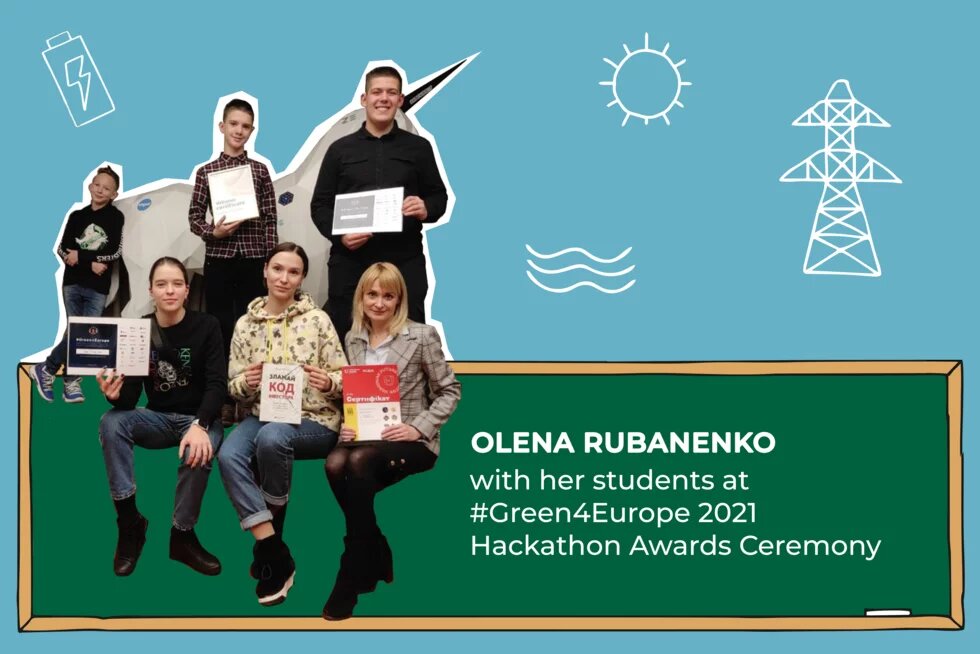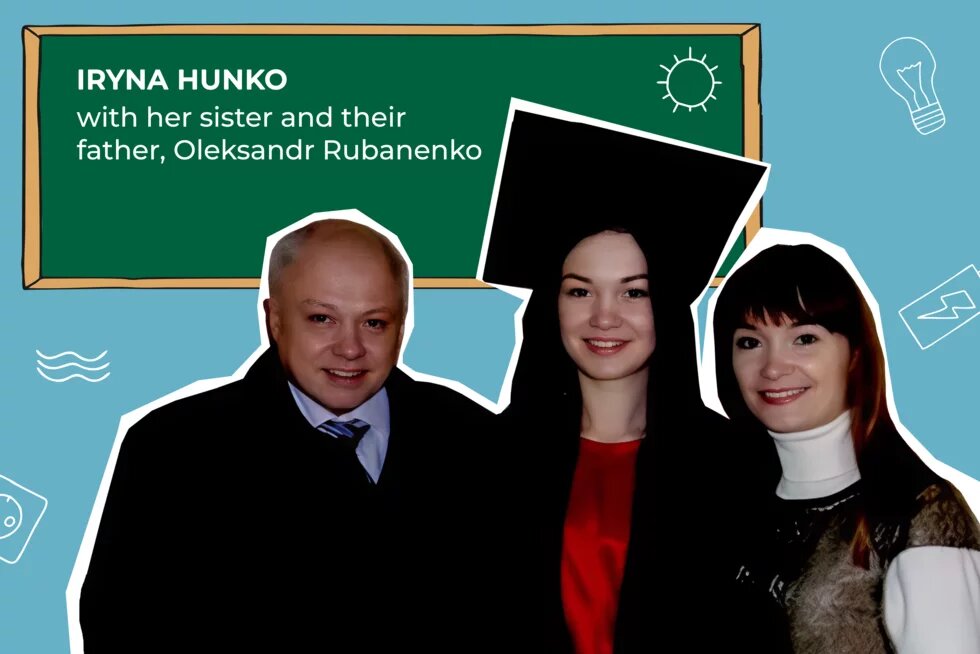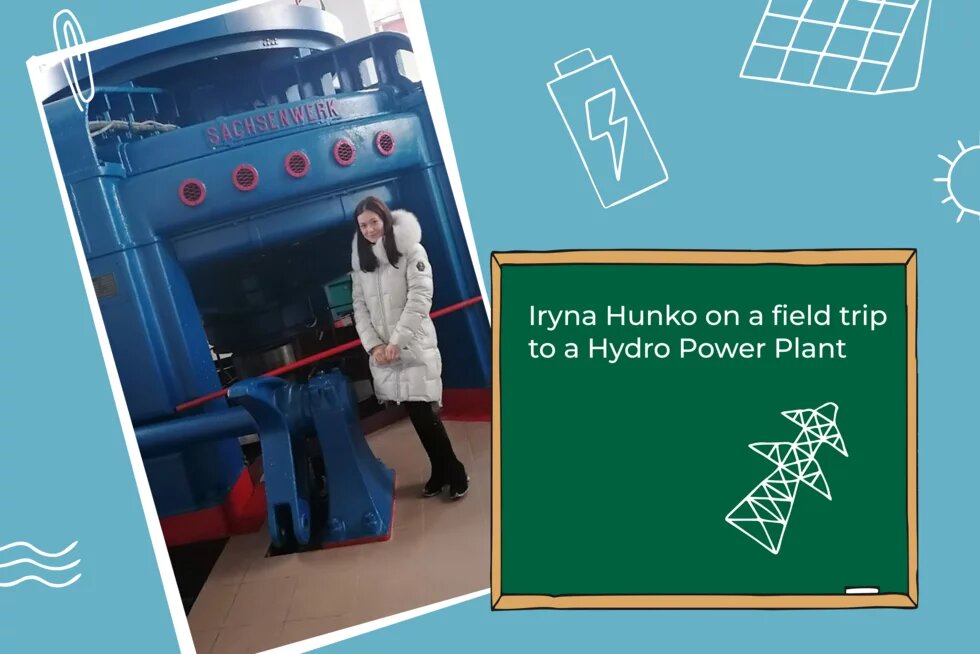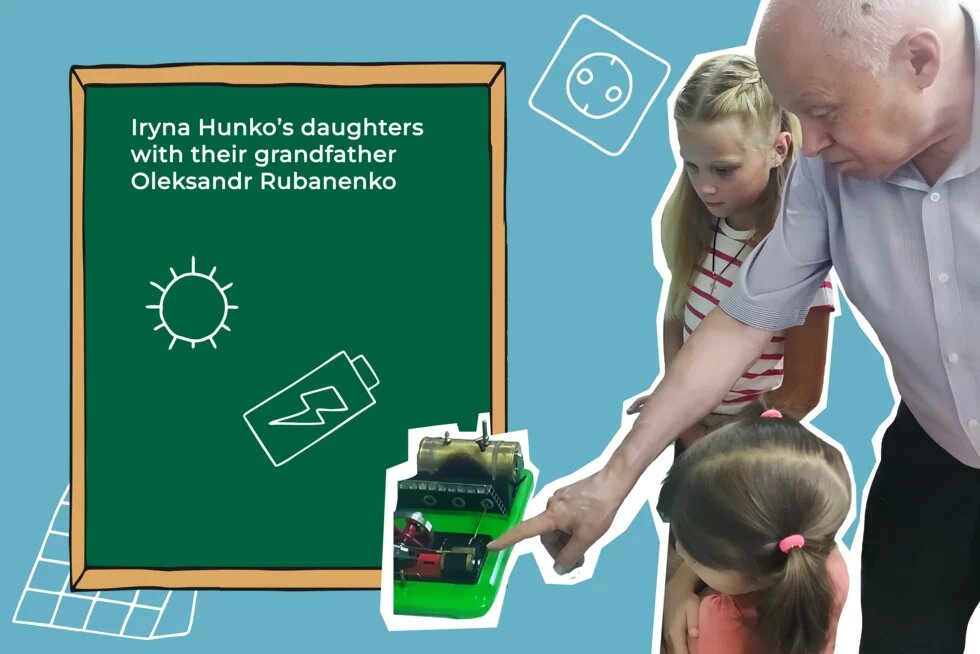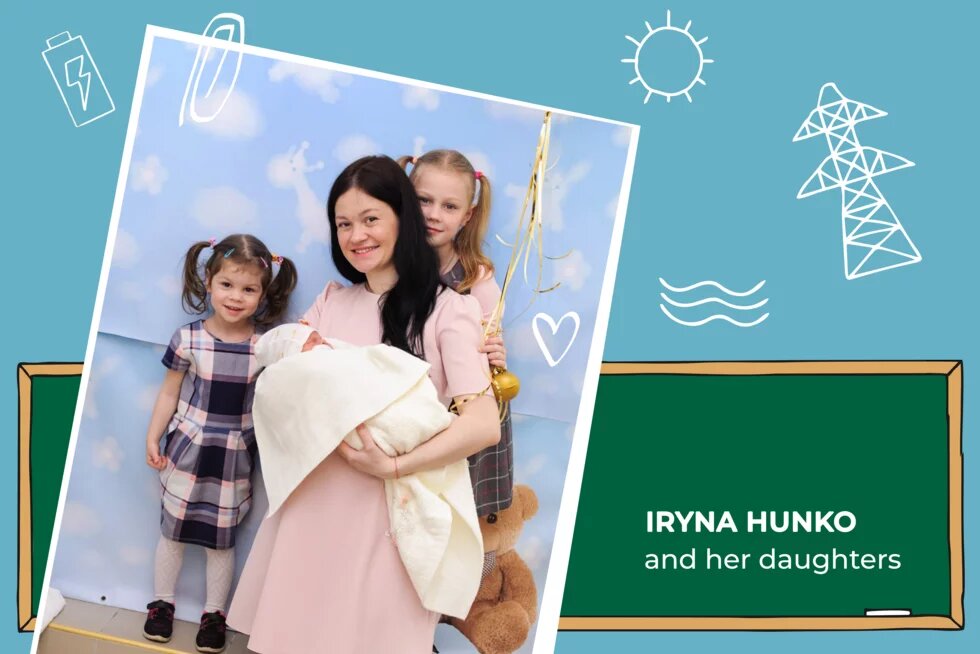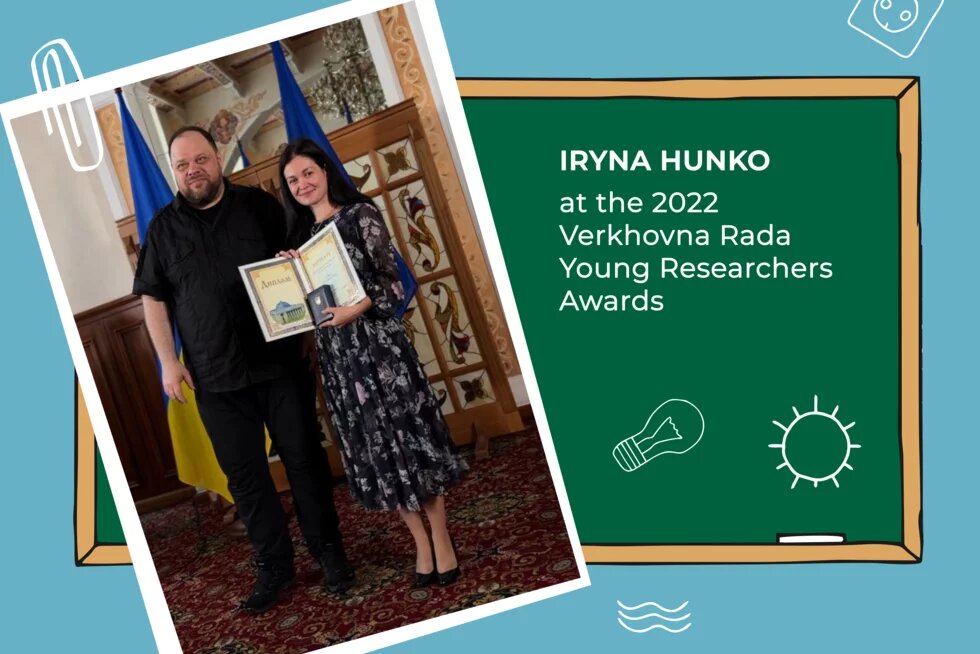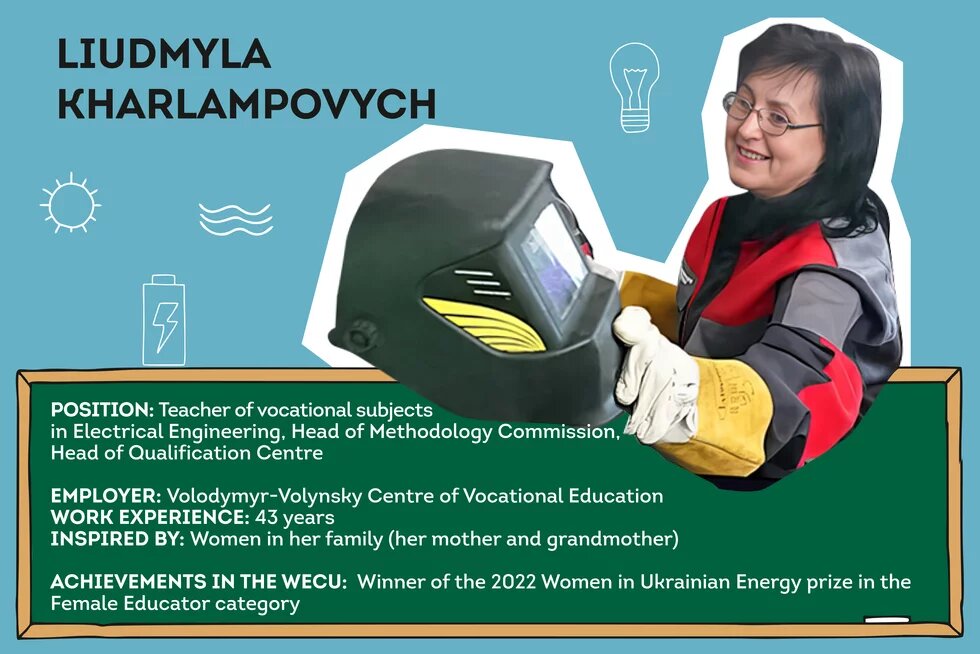
Together with our partners NGO Women’s Energy Club of Ukraine we are happy and proud to share the stories of women who are defeating the stereotypes in professions and making better Ukrainian energy sector.
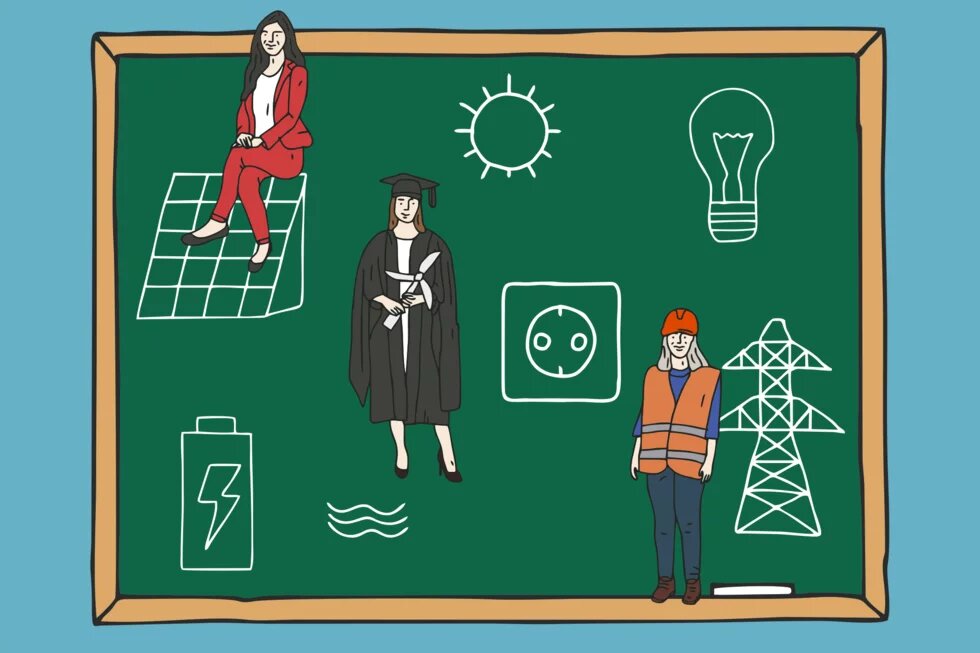
Since 2019, the non-governmental organisation (NGO) Women’s Energy Club of Ukraine (WECU) has been holding the annual Women in Ukrainian Energy competition under the auspices of the Kyiv (Ukraine) office of the Heinrich Böll Foundation. In this piece, we present interviews with three winners of this competition in the Female Educator category of different years. Why did those women choose the energy sector? Did they have to face gender-based stereotypes? What other challenges did they have to face? What helps them persevere and succeed?
We spoke with Liudmyla Kharlampovych, Olena Rubanenko, and Iryna Hunko to learn about almost half a century of developments in their field, their experience working in Europe, and how they juggle motherhood and their careers.
Liudmyla Kharlampovych - winner of the 2022 Women in Ukrainian Energy prize in the Female Educator category
"An electrician has to use their head before putting their hands to use. Otherwise, your life is short, although all bright and fireworks."
One might say that I got into the energy sector by chance. After failing the entrance exam for teacher training college, my first choice, I enrolled as an electrician in training at the educational facility where I am currently employed, what is known today as the Volodymyr-Volynsky Centre of Vocational Education. As soon as the classes started, I was hooked. This is an exciting trade that relies heavily on one’s logic and critical thinking; a very demanding job that requires a lot of expertise. An electrician has to use their head before putting their hands to use. Otherwise, your life is short, although all bright and fireworks.
My overall work experience is 43 years, 10 of which I have been working in education. However, my entire life and career have been linked with the energy sector, in one way or another. I just couldn’t do without it.
Today, in addition to teaching, I also work as Head of the Methodology Commission and Head of the Qualification Centre, so I’m involved in developing educational programmes and drawing up the curricula. For instance, we just finished the new programme “Installation and maintenance of renewable energy systems” for a new course at our centre, where we will be training professionals on installing and maintaining solar power stations. wind turbines, and heat pumps. This is so exciting, to be able to create something from scratch, teaching our youth and simultaneously educating ourselves!
"When I first started working as a female electrician, people were shocked" — on doing a “man’s job” in the 1990s
Men are jealous of “their” professions. I started working as an electrician at 21 and worked in that trade from 1987 to 1990. When I first started working as a female electrician, people were shocked, “How come a girl claims the job of an electrician? Is that even possible? What is she going to do?”
One might say that I had to take my qualification exams all over on every new job I took. However, as soon as I started that work, it took me only a month or two on a job before my co-workers stopped caring about my gender.
"I was the ‘gang leader’ for my younger brothers" — on the absurdity of gender-based stereotypes and developing a worldview
Even if I am combatting stereotypes, I can’t say this is something intentional. In my life, there was a hard period when my dad fell very sick, and both my mother and my grandmother did all the work regardless if it was “men’s” or “women’s.” My father, too, had no problem with cooking a meal.
My mother, an award winner, was very into sports. She even won a medal at the 1980 Youth Olympics. My grandmother lived a hard life, so she had to master both harnessing a horse to plough the land and fine embroidery. With this upbringing, it never crossed my mind that there was something I couldn’t do.
We, the children, never divided tasks by gender either. I am the older sister to four brothers, and it was me who was their “gang leader” [the woman smiles]. Even today, with each of us having a family of their own, I can see that things remain the same and that my brothers never shy away from any “woman’s work.”
When choosing our future professions, we were told to pick something we enjoyed doing. I guess we brought that sentiment to our own families. I mean, parents are the best role models for their child, and if the parents choose to impose limiting beliefs on their children, they in turn will be imposing those beliefs upon their children, too.
"People are no longer that surprised to see a girl willing to be trained as an electrician" — on stereotypes and developments in the field over the past 43 years
Even today, girls are forced to prove themselves in this trade. While a male electrician is perceived as something normal, every arrival of a female electrician to a construction site tends to stir things up. People still hold onto stereotypes.
Modern times, though, force changing this attitude. While life is getting more technological, no one is anymore surprised at girls wishing to study and work in the energy sector. This is already an increasing trend. Nowadays, employers pay more attention to the ability to perform the job rather than gender.
There was a time when a female driver was also met with raised eyebrows, you know, and now nobody really cares. I should add that most women are more cautious on the job, not just for their own well-being, but also out of concern for others.
As for education in the field, there are more female teachers than practical instructors. Still, I always tell my female students this: if you love your job, you shouldn’t be swayed by other people’s opinions.
"My daughters are in the military, so I also wanted to join them in the war" — on being a role model for her daughters and granddaughter
I have two daughters, aged 38 and 35. Both are in the military. My eldest signed her contract with the army just before Russia’s full-scale invasion, while the youngest joined the military at 19 and is now a lieutenant of the Armed Forces of Ukraine. When the full-scale war broke out, I also wanted to enlist, to join my daughters in the Army, however, my health proved to be too poor.
I was raised with no regard for gender-based stereotypes, so that’s exactly how I raised my daughters. My youngest revealed her interest in fixing things when she was four, which fascinated me. My granddaughter wanted to join a football team — well, why not? Everyone must try to figure out what they enjoy the most.
Why try to limit women’s aspiration exclusively to the spheres traditionally viewed as “woman’s work”, like a seamstress or a cook? Everyone has to be able to follow their calling and do the job they like doing. The crucial thing is to live your dreams and do the most fulfilling thing.
"I joined my first ever WECU webinar due to it having the word ‘Women’s’ in the title" — on her involvement with the WECU and the club’s importance
One day, as I was scrolling through my Facebook feed, I came across an event by some Women’s Energy Club of Ukraine. That was my first time learning about the club, despite it being active for several years. It triggered my curiosity that there was a place where women working in the energy field could gather, have discussions, and carry out some projects. I joined my first ever WECU webinar due to it having the word "Women’s” in the title. I remember thinking, "WOW, so there is a place where female energy workers can gather!"
Today, I do my best to be a part of every possible online event. I would gladly join offline events held in Ukraine, too. I love it that most of the topics discussed are related to the strategy of sustainable development and environmental projects.
Sometimes, it might seem that the next webinar’s topic is not something you’ll be interested in; however, you always learn something useful. Plus, everything is interconnected, like, for instance, the fields of environmentalism and sustainable energy. The meetings give you an opportunity to hear people out, understand the latest developments in their field of expertise, and readjust your own understanding of how things are. I mean, you gain the ability to see past your own nose.
"Women tend to be more environment-oriented, so it’s crucial to involve more women in the energy sector" — on how to popularise jobs in the energy sector and make it more gender-balanced
To encourage more women (and men, as well) to apply for jobs in the energy sector, we need more career guidance counselling from childhood. Thinking back to my own childhood and youth, I recall us being told about trades and simple activities like gardening and baking bread, milking cows, etc.
I believe that is something that present-day schools are lacking. From an early age, kids should be educated on different professions and trades, and what people doing those jobs are being paid for. That way, a child can try to figure out whether that’s something they, too, would like to be doing for a living.
It is crucial to involve more women in my field. I believe that a modern woman has to have a grip on things related to the energy sector even if she’s not working in the field, as in today’s world, one has to understand the underlying processes and know how to use them to your advantage.
And, by the way, women tend to show more interest in environmental protection, as we think of and care for our children and grandchildren, and for the future health of our nation. We want to create a safer world. Personally, I believe we should prioritise alternative energy sources like solar power plants, and even hydro power plants, over some thermal power plant that burns coal and emits harmful stuff into the air. As women, we don’t just think about specific technology, we also consider it to be safe for the people we care for.
"We need effective communication between educational institutions, businesses, and the state" — on problems in the energy sector and overcoming them
In vocational education, facilities and resources are key, and they need to be constantly updated. The equipment one works with in any trade keeps being improved, so our students have to be properly trained to work with that equipment. Think of Germany, for instance — that’s the country we were working with in the past, and our cooperation continues. There, businesses strive to equip the educational institutions where their future workers are trained with the most up-to-date equipment.
What about us, then? It’s no secret that today’s farming equipment is largely controlled by joysticks, yet we are forced to train our students on T-150 tractors that basically belong in museums, not in training. I mean, that’s a real-life story, when a group from Japan came to visit, and were like, “Wow, you have a museum in here!”, speaking about the equipment we use to train students! Today, having won a grant, we are working on procuring modern tractors.
Timely upgrades to equipment allow us to better train future workers. We need effective communication between educational institutions, businesses, and the state. We need to be able to bring our students to production sites while they are still in training, so they can see how it all works in real life.
Another problem is that we need better coverage of the actual needs of the job market so that future students can understand the actual demand for professions and trades and wont’ waste their time getting an education that basically renders them unemployable.
"Education can’t be put on hold" — on developing education during wartime
Of course, today, in times of war, we need to be primarily investing in our victory. However, we need to understand that sooner or later, the war will be over and we need to be thinking about future recovery efforts right now. How will we be developing our economy? What kind of specialists do we need for that?
I guess no other sphere is evolving so rapidly as the energy sector. What was considered nothing more than fiction only recently became our present-day reality. Even in my lifetime, I remember when people had to go to a public phone office to call someone, and when people used to communicate via postal mail. Today, we make video calls, able to simultaneously see people and join in from different cities.
Thus, education can’t be put on hold. As time passes, more and more specialists will retire, and they have to be replaced. Those replacements need to be properly trained. It is crucial that everybody understands the importance of developing education in the energy sector, and that the students are trained on modern equipment. And we, for our part, will do everything in our power to make it happen.
Olena Rubanenko - winner of the 2021 Women in Ukrainian Energy prize in the Female Educator category
"While other kids were playing with dolls, I played with transistors, resistors, and small electricity transformers" — on work in the energy sector being a family thing
I come from a long line of energy workers, with a mechanic grandfather and a father working in the energy sector. He was employed in laboratories at a lamp factory, experimenting with different equipment, and after I was born, he transferred to the same university where I am currently employed.
When I was young, I spent a lot of my time at my dad’s job, so I have known these laboratories and all this equipment since I was a child. While other kids were playing with dolls, I played with transistors, resistors, and small electricity transformers [smiling].
When it was time for me to decide on my future profession, I was choosing between history and the energy sector, and decided to set my sights on what I knew best. After getting my Ph.D., I started teaching, being employed by two universities at once, Vinnytsia National Technical University and Vinnytsia National Agrarian University.
I had my share of difficulties. For instance, I once had to teach a group of students who were older than me, or groups with not a single female among the students. However, I never changed my profession, because I’m in love with the energy sector.
"Persuaded my husband to hire some girls" — on women in the energy sector
In my student years, there were nine women out of thirty people in my group. Some professors used to say that we enrolled in the Power Engineering Department to find a husband, as most of the students were ladies. The curious thing is, those weren’t even the professors teaching principal subjects, but guest lecturers from other faculties. We, the ladies, weren’t happy to hear such remarks.
Another stereotype I had to face was at a conference, right before I was appointed as a professor. After my presentation, I was approached by a respected professor who offered me… to try and apply for the doctoral programme! Me, who had graduated from that programme already! I mean, I was pigeonholed not just as a woman, but also as a young woman.
Stereotypes are really ingrained in people’s minds. My husband, for instance, also had to face his internal dilemma of hiring women, “How am I supposed to send them on business trips? What if their young children fall ill?” We had a conversation back then, and I managed to persuade him that a solution could be found for every specific situation. Besides, I told him, in our day and age, men, too, were eligible for parental leave, or could take a day off work to take care of their sick child. He ended up being very happy with the performance of the ladies he hired back then because all of them were really good professionals.
Even today, women are forced to prove their expertise in the fields where no such proof is demanded of a man. There’s a positive change, of course, specifically in the 20 years that I’ve been working in my field. For instance, as a student, I really liked the job of a power networks dispatcher. I viewed those specialists as elite. This job was considered super cool, however, back then, women weren’t accepted for the job! Today, to my knowledge, there are women doing that job.
"Women enjoy the same positions as men – no privileges, no discrimination" — on her experience of working in Europe
As someone mainly living in Europe since 2019, I noticed that here, gender equality has become something that goes without saying. I mean, men still constitute the majority of the workforce in this sphere, but these jobs are available for everyone. Maybe that’s because they started working on this issue before we did, implementing projects that required a Gender Equality plan, which prompted respective decision-making and incentivised involving women.
Here, women enjoy the same positions as men – no privileges, no discrimination. There’s financial equality, too, which is something that I really want for Ukraine, where the wages of men and women vary significantly.
At the same time, some things shocked me here, too, like not celebrating International Women’s Day or Mother’s Day, or not giving up seats to women on a bus. I mean everyone here is treated more equally. While initially surprised, I soon got used to it.
But just for comparison, recently, I had to travel for work to India, where I spent two weeks. There, women are in a worse situation than in Ukraine. Just so you understand, the authorities there didn’t even want to let me in the country, denying me the visa!
While working in education is a respected position, you need to get there first. Female colleagues from India shared that when there are kids of both sexes in a family, and the family only has enough funds to educate one child, boys are always given the preference. Besides, in that country, one’s social class is also important. For instance, when our transfer picked us up, the driver didn’t take my bags, instead, he took the bags from my superior, as he was the boss in that situation.
"I bought into gender equality being possible in Ukraine when a woman was appointed the Minister of Energy" — on women that inspire her
I always knew that women could do anything. My mother served as a military officer in the Air Force, and even my grandmother drove a KrAZ (author’s note: a Ukrainian all-wheel-drive cargo truck). Women in our family were really into “men’s jobs.
However, I bought into gender equality being possible in Ukraine when Olha Buslavets, a woman, was appointed Minister of Energy. To me, that was a turning point, a sign that a woman can really have a career in the energy sector. By the way, Ms. Olha and I authored an article together.
In the research field, I admire Maria Sklodowska-Curie, the first woman to win the Nobel Prize. As for my contemporaries, there are two women that I admire. One of them is Tamila Surzhyk from the Institute of Renewable Energy. She’s such an inspiration, that if you just talk to her briefly, you instantly get a thirst for defending your own doctoral thesis [smiling]. Tamila was the one who read my thesis and helped me improve it, guiding me along the way.
The other is Veronika Cherkashyna from the Kharkiv National Polytechnic Institute, who defended her thesis at the Institute of Electrodynamics. Her story also inspired me to pursue a doctorate in the field of energy. However, I was there when Ms. Veronika defended her thesis, and I saw the hardships she had to face. Still, she never gave up and ended up succeeding.
"It helps me believe in myself, and is a great incentive to motivate other women" — on the WECU and its annual contest
After winning the award in the WECU contest, my other projects were implemented better, as I was more active in applying for other competitions, too. Winning helped me believe in myself and was a great incentive to motivate other women. I am forever grateful to Viktoriia Vostriakova, Head of the NGO Sustainable Development Agency SYNERGY, who supported and motivated me along the way.
For instance, I became a mentor for the WECU, with three mentees as my charges. With them, we were looking into a variety of opportunities for their career advancement. After that, I was invited to become a mentor at yet another women’s club with an office in Vienna. Today, I have a Ukrainian mentee, and I’m very happy with this opportunity to be of use to my people.
"We need to be introducing scholarships for talented girls" — on ways to involve more women in the energy sector
When thinking of involving more people in the energy sector, we need to be starting from kindergarten. It is important to hook children aged 5 and 6 — and I’m speaking from my experience of working in an engineering workshop for kids — for instance, by explaining to them how an engine works. And it is worth emphasising that women can pursue that path, too. To do that, we need to show more success stories, perhaps through making movies or short films. We also can hold a variety of hackathons, ecotones, and workshops, where children can try their hand at different activities and decide what they enjoy doing and what they don’t.
Another great way to motivate female students is to offer them assistance with employment after they’ve finished their studies. I think we need to be introducing scholarships for talented girls enrolling in technical and engineering studies.
Businesses need an incentive to employ women. For instance, I’ve watched research institutes in Europe bragging about who has the most females. Also, European employers have plans in place to help their female employees get back to work after maternity leave — I’ve never heard about any projects or government programmes aimed at that in Ukraine.
"We need to establish the connection between businesses, research facilities, and education institutions" — on problems in her field and possible ways of overcoming them
I believe that online classes have a drastic impact on the quality of modern education. In the energy sphere, we need plenty of practical workshops that are difficult to hold online. Even from my personal experience, there’s a difference in my understanding of topics that I learned online and those that I learned offline.
Another problem is that the energy sector evolves rapidly. With all the decentralisation processes in place, we see more and more renewable energy projects being implemented. However, we don’t have enough universities equipped to train experts in this field. Thus, it is crucial that more universities launch respective courses, keeping up with the times and training students in professions and trades that are actually in demand in Ukraine’s recovery efforts.
To train students, they need facilities and resources — and this is where it is crucial that businesses and the state lend a helping hand. I mean, yes, we have companies whose executives understand the importance of donating equipment today so they can have more new employees who know how to work that equipment tomorrow. However, Ukraine still has a long way to go before these practices are as widespread as in Europe. We need to establish a connection between businesses, research facilities, and education institutions.
As of now, even re-equipping some laboratory seems unattainable. For instance, I am currently in a programme on creating portable stands or laboratories, which is especially relevant for Ukraine’s current conditions, when students routinely have to rush to shelters in the middle of their classes.
It’s also crucial to be able to retrain specialists within short timeframes, like a year or two, so that their knowledge and skills are always top-notch. For instance, let’s imagine people who used to work at a thermal power plant that ended up being destroyed by Russians. One way to revive the facility is to put heat pumps in there and to do that, the former employees need to be re-trained so that they are qualified to work in renewable energy. I believe that universities must also play a role in such re-training.
Iryna Hunko - winner of the 2023 Women in Ukrainian Energy prize in the Female Educator category
"The level of responsibility is overwhelming, so you need to study hard" — on the energy sphere and its special nature
My life path is similar to that of Olena Rubanenko, as she is my sister and we were raised together. Our dad worked in the energy field, and, same as Olena, I was also a frequent visitor to his workplace.
Besides my father, my other source of inspiration is Olena, 6 years my senior. From her, I got first-hand stories on studying to become an expert in energy, on their field trips, on all the interesting things that they were learning, and all the exciting laboratory classes they were taking. I saw that the future relied heavily on the energy sector for it being indispensable.
Back at school, I really enjoyed taking classes in physics and mathematics. I was in about seventh or eighth grade when I decided that I wanted to enrol in a technical university in the future. That was exactly what I did several years later, and then I applied for a master’s programme, and then a doctoral training programme. Today, I have 10 years of working in this field behind me.
As you immerse in your studies, you start to get a grip on the complexity of this sphere, and the importance of having a solid expertise in it. Some unforeseen circumstances of a mistake made by staff can lead to emergency situations and disruptions in power supplies. That, in turn, can cause losses for businesses and create dangerous situations for people’s health and even lives. The level of responsibility is overwhelming, so you need to study hard. This is a very difficult field, but a very exciting one, too!
"I was inspired by seeing other women getting their degrees and achieving their goals" — on how success stories are motivating to fight for your place under the sun
I believe that the stereotypes were something plaguing previous generations, as I can’t say I felt their influence in my life. However, if we look at the male-female ratio in academic councils, and the number of men and women who defended their thesis, of course, men still prevail.
At the same time, more and more success stories of women pop up! That was the reason I wasn’t afraid to enrol in the doctorate programme, for I was inspired by seeing other women getting their degrees, becoming professors, and achieving their goals.
I find it inspiring that Ms. Olha Buslavets became the Minister of Energy in 2020. For me, it’s a bright example. I also got to know other women from the WECU, and I’m utterly smitten by the success stories of Khrystyna Kasianova, Nataliia Revutska, and every other female colleague of mine! I mean, they succeeded in a variety of spheres. I always find their keynotes, webinars, and seminars refreshing.
I believe that my decision to join the club was a good choice. Here, we have a really supportive community where everyone can find her niche and tasks worth pursuing. All of my colleagues are very interesting, and they are real professionals. The club nurtures a networking environment, helping us expand our professional connections. Here, you can see how vast this field is in Ukraine, how many different niches there are, and how many talented female professionals are working in each of them.
"I have three daughters, aged 10, 5, and 1, and I never say things like, ‘Girls have no business doing this or that’ "— on involving girls and women in the energy sector
We need a certain level of media coverage in order to involve more girls and women in the energy sector. We need to show that this sphere can be very fulfilling for women and that one can earn a decent living here. As most young people tend to spend a lot of time on social media, we need some promo videos and podcasts on this topic. We need to be sharing success stories and show the youth all the possibilities awaiting them.
It makes sense to start working with kids when they are young by introducing interesting hobby clubs and the like. My daughter, for instance, participated in a robotics club. The interesting thing is, while initially she was the only girl there, when I shared her story with my acquaintances, they also brought their daughters along. So in the end, there were, like, five girls and six or seven boys.
Even today, some parents have preconceptions that a technical field is “not for girls”, so we need to educate parents, too. Another important thing is that the clubs and schools must be affordable, because everyone benefits from having more experts in this field, so they need more encouragement.
I have three daughters, aged 10, 5, and 1, and I never say things like, “Girls have no business doing this or that.” In my circle, I’ve met female freight movers and female truckers. Even my own grandma drove a KrAZ. And how many women are out there working in factories, in heavy industries? Before joining the WECU, I had never imagined that we had so many women working in the energy sector! And many of them are performing quite tasking jobs.
So I don’t impose any stereotypes on my children. They have to choose their own paths depending on their preferences. It is great to be able to go to a workplace you love, and then go home feeling fulfilled, not bringing your bad mood home because you enjoy doing your job and find it quite interesting.
"Having support is crucial" — on juggling motherhood and her career
It’s my third time taking maternity leave, and I want to mention how lucky I am, having the full support from both of my children’s grandmas. I am lucky to have my research advisor, Mr. Petro Lezhniuk, who is very understanding of my situation. I can send him my notes for reviewing late at night, and then call him the next morning as I am taking my kids for a walk.
My husband also shoulders a fair share of chores. With three kids to support, he works really hard, but he makes sure to spend his days off with us. He also supported me as I was working on my doctoral thesis, and he took our kid out or to some club to give me some space. Having support is crucial.
I took one year of maternity leave with each of my daughters, but I worked hard to stay up to date. I was reading energy news as I was taking my kids for a stroll, enrolled in a variety of courses to develop my skills, and took on jobs that didn’t require a lot of time or had flexible deadlines. It really helped me to stay at the top of the game, because my understanding is that it’s hard to go back to work after maternity leave, and hard to adapt.
Frankly, combining motherhood and a career is extremely hard and requires a lot of planning – when and where to pick up your kids and where to take them, when to feed them, how to keep up with their clubs, schools, and medical appointments… It’s hard work, I must say. However, there’s also that need to find fulfilment and make the most of the passion I have. This is how our father raised us, instilling in us that a woman must be both self-sufficient and live a fulfilling life. That’s the attitude I grew up with. I never even doubted the importance of finding such balance, a symbiosis of sorts.
"Companies should have more favourable policies for mothers" — on creating a barrier-free environment for women in the energy sector
Being a mother, I find the energy sector’s lack of flexibility in work hours the most challenging. Because of that, some of my female friends couldn’t return to their jobs at classified facilities after their maternity leave.
Women face the problem of not having time to drop off their kids at kindergarten or school in the morning and pick them up in the evening, especially if the commute to their workplace is long. Those who have the luxury of support from other people manage to handle things, but those who don’t have such support face the hard choice of either leaving the field altogether or transferring to a part-time position.
I think when it comes to work hours, employers need to give mothers more flexibility. Of course, it’s easier in private enterprises, as the managers tend to be more understanding.
As for working in education, the key factor here is the transition to online studying. Of course, universities do their best to hold as many laboratory and other practical classes offline. Technologies in energy, the same as elsewhere, evolve rapidly, so we want to teach our students using modern equipment, and having support from businesses and the state is crucial. And, of course, we need to understand that in order to train high-quality experts and incentivise them to remain in the field, the wages have to be sufficient, too
Background
The NGO Women’s Energy Club of Ukraine (WECU) is an independent professional association of women working in the energy sector, and participation is voluntary.
The club unites over 200 female members, including female experts on energy, female advocates from both national and international organisations working on reforming Ukraine’s energy sector, female envoys of businesses and NGOs, female MPs, and women simply interested in just and sustainable development of Ukraine’s energy sector.
The annual Women in Ukrainian Energy Award was initiated by the NGO Women’s Energy Club of Ukraine (WECU) in 2019.
The purpose of this competition is to recognise the important roles that women play in developing the Ukrainian energy sector, supporting them, and motivating them to further advancements in the field and related sectors, recognising the competitors’ contribution to establishing gender equality in the energy sector, vocational training, research, and specialised journalism.
Categories for the contest are determined annually. Through the years, they have included Company of the Year, Female Boss of the Year, Female Worker of the Year, Female Journalist of the Year, Female Educator of the Year, Female Leader on Decarbonisation, Female Politician, Female Volunteer, and Female Lawyer.
The competition is held under the auspices of the Kyiv (Ukraine) office of the Heinrich Böll Foundation.
Further reading on women employed in the energy sector:
-
2018-2019 research Women in Ukraine’s Energy Sector (in Ukrainian)
-
2023 research Women’s Role in Ukraine’s Energy Sector in Times of War: Towards Stability and Equality

